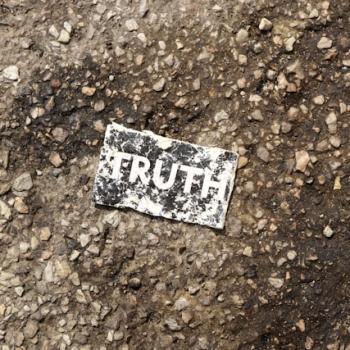
A few years back I watched a YouTube clip of an interview with apologist Ken Hamm. The interviewer, an atheist, pressed Hamm on his perspective on science. What would happen, the
atheist asked if science contradicted the Bible.
Ken Hamm insisted that there were no instances he had ever experienced where true science and the scriptures did not align. The interviewer continued to press, so Ken Hamm
was honest. When the Bible and science contradict, he chooses to trust the scriptures.
At the time I felt conflicted about that. I believe the Bible is true and inerrant. However, in my mind, it seemed more fair to continue insisting that the facts line up with the Bible rather than
starting such a bold claim. Most people believe that scripture should be secondary to ‘facts’ rather than the other way around. It wasn’t until I read The Three Body Problem that I began to change my perspective on that.
Outside Forces
In most of the previous articles I’ve posted, such as with War of the Worlds, or Foe, I have taken the story as a whole and engaged with the specific themes largely as the author or director has
presented it. When looking at The Three Body Problem, I’d like to come to this story from a different direction. I highly doubt that Liu Cixin, the author of this Chinese-language book, would have expected anyone to draw the conclusions I did. More importantly, I have not looked at the plot of these books as a whole. Rather, I’ve been drawn to a particular chapter.
The first book of the trilogy, The Three Body Problem, revolved around humanity’s discovery that an alien force is en route to Earth with the expectation of taking the planet as their own.
The tri-solaran as the book describes these aliens, hail from a planetary system where three suns create an incredibly unstable orbit and conditions unfavorable to life. Through the work of a Chinese political prisoner, Ye Wenjie, the aliens were not only made aware of Earth’s existence, but they were able to gain human allies on Earth. They have also sent tiny
computers to not only spy on Earth’s inhabitants but to stop any scientific progress. The Tri-solarans know that human science and technology would have them at a disadvantage if they were allowed to progress unimpeded.
At the beginning of the book, the unaware human race is starting to see the impediment of the tiny computers in their work. Several scientists have been specifically targeted and have
committed suicide as a result. Several others have left the field. When the protagonist’s ex-girlfriend commits suicide, and he starts to see numbers counting down in his field of vision, he goes to see one such scientist.
Are the Rules of Science Static?
When the protagonist interacts with the retired scientist, now living in a friend’s basement, the scientist reveals a terrifying concept to him. Scientific laws, the man explains, are not given to us. We as humans must observe the world and make assumptions about how it works based on what we experience and see. In the grand scheme of the universe and time, at least as some people would believe, humans have not been around long. Moreover, we’ve only seen a small portion of the universe, and not have even observed all of our planet.
The scientist shows the protagonist of The Three Body Problem how relatively small variables can change the outcomes of specific experiments. What if he postulates, the entire time we have been observing the universe, our science has been skewed by one or two small variables? The scientific laws that are true on Earth may not be the same as the scientific laws that are true on Mars. Things we feel are true today, could only true for the space of say, a couple of hundred years, and they will change with age. There is a lot of possibility for error.
In this chapter, we find out that science is no longer behaving as the scientists expected it to. The basics of math and physics are no longer proving true. Imagine waking up one day and 1 plus 1 no longer equals 2. Can you imagine the confusion?
This chapter is powerfully written, and the reveal leaves the reader with genuine dread and despair. If that is true for this fictional world, as incredible as scientific research is, how much more terrifying is that concept in real life? What if all the rules suddenly changed?

Where is North?
Do you know what North is? You might be able to point to the North Pole on a map. This time of year, you might see a version of it on screens along with Santa’s workshop and green-clad elves.
You might even be able to point to it from where you stand. I know for us when we moved to Florida, North was the opposite of what we expected. I still get turned around and think North is
South and vice versa.
The reality is that there are two “norths” as we know it. The North Pole, or True North, is the axis on which the world turns. At least, that we can calculate. If you pull out a compass,
however, North is identified by the magnetic field it produces. So we have also the Magnetic North Pole.
The term “True North” is often used to mean something that holds the most impact and truth in your life. When you ask someone what their “true north” is, you are asking them what keeps them moving forward. What they are living for. It is not only the most true truth but the most impactful truth. If you choose the wrong instrument to find true north, you will find yourself lost on a shifting ice cap in the middle of the ocean far from any form of help. A compass may get you close enough to navigate from a distance, but it’s created to help you get from place to place. It’s not created to bring you to the true north.
Far worse than that, if your compass has been exposed to closer magnets, it may confuse the result even more. It is not even helpful for its purpose anymore.
Like that, science is a compass. It can help identify truth, yes. It can help you get home. For the most part, science and scripture will align closely enough that they will agree. Most of the time,
when they don’t there is a misunderstanding in either scripture or science.
Sola Scriptura
In 2 Timothy we read that all scripture is God-breathed and profitable for teaching, for reproof, and correction.
The longest passage in scripture, Psalm 119, is a poem extolling the power of the word and law of the Lord.
Revelation 22:19 indicates the seriousness through which God protects scripture. In my last article, I shared some of the personal reasons why I believe that scripture is truth, rather than fiction. I highly recommend you take a look at that, and at more powerful arguments shared by apologists like Frank Turek, John Lennox, Cliff Knechtle, and more.
In the end, science and scripture serve different purposes. Science seeks to learn about the world we live in while scripture reveals God to us. Both can exist in perfect harmony and both
are necessary.
However, if there is no way to find an understanding between the two, I encourage you to make Scripture your true north.
Join me Friday, 11/29/2024 for a look at the classic book The Strange Case of Dr Jekyll and Mr Hyde.













